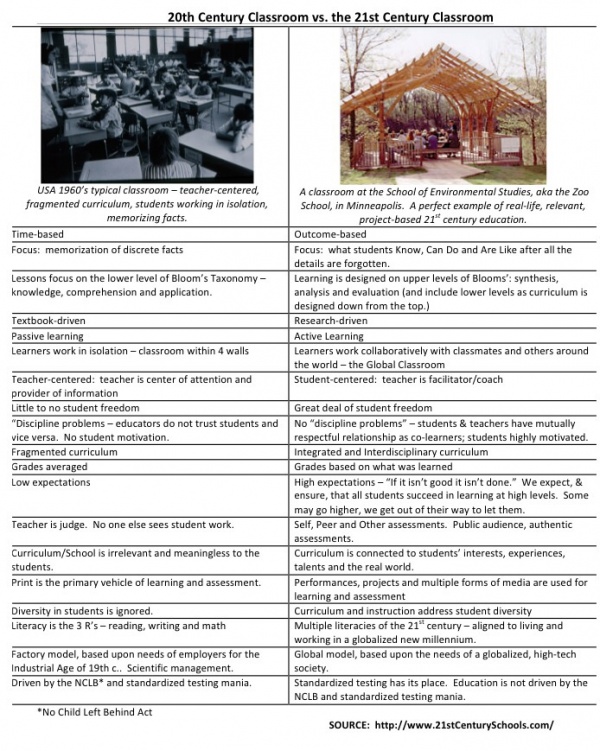Maintaining Innovation

“Innovation” might be the most used word to frame the current narrative of change in education. It’s been used to drive the use of technology but also as my friend George has done, used to change mindsets. It’s difficult to argue against the idea that education was, or is still in need of change.
For those who continue to suggest that education has not changed in the last 50 years or so, I don’t think you get out much. The schools and classrooms I visit are making great strides in shifting the locus of control from teachers to students. They aren’t there yet but in the vast majority of districts, this is a driving focus.
As someone who has taught pre-service teachers, I often have them reflect on this chart.
Almost all of them acknowledge a shift from teacher to student focus. Some of the other areas are a blend of the left and right columns but they almost all agree their recentK-12 education was not completely on the left side of this chart.

Ok, so some will debate my perspective and that’s fair enough. My observations are just that. But for those using blanket statements about how school hasn’t changed, they are cherry picking too.
But what I want to argue is that innovation is but one element of learning and change. Maintaining, which might be seen as somewhat counter to innovation, is likely a more important conversation we rarely talk about and if we do, we view it as a lesser existence or priority than innovation.
All Hail the Maintainers is a powerful article (if you’re short of time, leave my post and read it instead) that looks at how innovation has been overvalued in society and that maintaining is not only critical for change but what the majority of humans should focus on. Here are a few snippets from that article.
Tools and ideas to transform education. Sign up below.
Infrastructure’ is a most unglamorous term, the type of word that would have vanished from our lexicon long ago if it didn’t point to something of immense social importance.
Despite recurring fantasies about the end of work or the automation of everything, the central fact of our industrial civilisation is labour, and most of this work falls far outside the realm of innovation.
The most unappreciated and undervalued forms of technological labour are also the most ordinary: those who repair and maintain technologies that already exist, that were ‘innovated’ long ago.
I have great concerns about the educational fetish of entrepreneurship. As I’ve written before, the danger here is passion and vocation are synonymous. The idea that being your own boss, like driving your own learning is the ultimate goal. While providing these options for students is what we should be doing, I fear we have sent an unintended or worse, an intended message that innovation and entrepreneurship and branding should drive your work and learning life. Owning your learning is not the same as being an entrepreneur.
What this emphasis does is devalues people like your custodial staff who work behind the scenes maintaining the spaces where children learn. As the article states, the vast majority of human work is in the area of maintaining. Those privileged few who carry the label of innovator or entrepreneur, are beholden to men and women who do the daily work of maintenance. Even within education, there is a great deal of maintaining. Maintaining might be considered “status quo” which is almost always seen as a dirty word in education. But many aspects of status quo are useful and healthy. The mantra of change continues to suggest that everything schools have been doing is wrong or outdated. Reading good books, learning about the world, singing in a choir, developing healthy bodies are all part of the maintenance of our education system. Are there opportunities to innovate within those activities? Certainly. But there is an equal, perhaps greater amount that doesn’t need to change.
There’s also a danger of selfishness when in comes to innovation and entrepreneurship. Branding and entrepreneurship are about self. Making sure you are heard and having your brand protected and calculating your every move. I’ve shared before about my feelings on branding with students, and continue to be extremely skeptical of that vernacular. Without being diligent, the entrepreneur and a branding mentality often see those who maintain as servants to the real work of innovation. The entrepreneur is typically a very driven focused person bent on promoting and seeing their vision actualized. Obviously, this is very one-sided but also is the one-sided, blind way in which we worship those who have taken this path.
Take a look at this video
This is the kind of video folks share constantly to make the point that being compliant, doing what you’re told and being good in school doesn’t change the world. But the part of this video people ignore is that these students found good jobs and we don’t know if they are happy or contributing members of society. What the research seems to show is they aren’t “changing the world”. We need all kinds of students. We likely need more students who aren’t changing the world via their work but maintaining in their work and families and communities. (Full disclosure: 3 of my 4 children were valedictorians and they are happy, healthy and doing fine. I couldn’t be more proud)
When I look around, the vast majority of people are maintaining. How wonderful to know that someone is working to keep the lights on. Congratulations if you’ve “innovated” and changed your mindset and practice. That’s great. But if the change you made is so great, I’m guessing you’re working on how you maintain it. If not, then perhaps your just seeking the rush of “new” and are forgetting the value of “old”. So I wonder what we can do to celebrate and honor the maintainers? How do we continue the conversation and shift to empowerment that still values maintaining and sustaining many of the existing constructs of life? If you’re a high school student does your school suggest you find a job that maintains? While we may have continued work to do, I would be thrilled if more schools would take pride in the innovations they’ve achieved and now spend more time and energy in maintaining.
cross-posted at ideasandthoughts.org
Dean Shareski is the Community Manager of the Canadian DEN (Discovery Educators Network) and lecturer for the University of Regina. With 24 years of experience as a K12 educator and consultant, he specializes in the use of technology in the classroom. Read more at ideasandthoughts.org.
Disclaimer: This weblog contains the opinions and ideas of Dean Shareski. While there may be references to my work and content which relates directly to my work, the ideas are mine alone and are not necessarily shared by my employer.
